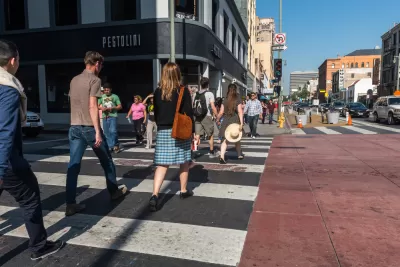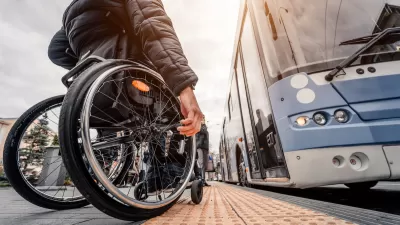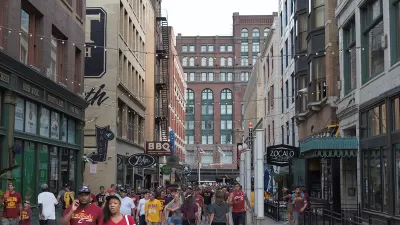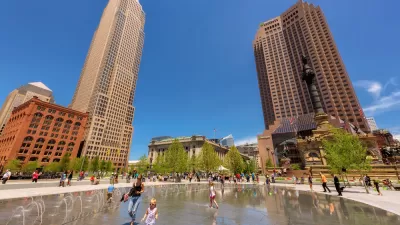Advocates argue that even famously car-centric Los Angeles can become a place where residents can easily access their daily needs without getting behind the wheel.

A coalition of planners, architects, and advocates think Los Angeles—“the ultimate car city”—can become a 15-minute city. That is, with better planning, most residents could reach their daily needs within a 15-minute walking, biking, or public transit trip, reports Erin Stone in LAist.
According to Jenny Hontz of the Livable Communities Initiative, “cars are a culprit when it comes to high rents: cities require developers to build parking spots with housing. In L.A., each spot can cost more than $50,000, upping rent prices.” Consequently, “Higher costs push Angelenos out of the city and into longer commutes, adding to planet-heating emissions. According to 2019 census data, 13% of Angelenos who commuted to the Westside for work drove more than 50 miles to get there.”
The coalition argues that “building smaller housing developments without parking, close to jobs and public transit, coupled with redesigning streets to be more walkable and bikeable, would lower rents and pollution.”
As the article notes, “Implementing the plan doesn't come without obstacles: among other things, it will require rezoning certain areas, dealing with legal challenges and red tape, and dropping the requirement to build parking, in addition to political and industry buy-in.” But with Los Angeles including it in the city’s housing element, it could have legs. Culver City, a small incorporated city on L.A.’s west side, “is on its way to implementing many of the ideas and possibly also working it into their general plan.” Meanwhile, a proposed state bill could eliminate parking requirements for small developments.
FULL STORY: The '15-Minute City': A Strategy To Reduce The Traffic, Pollution And High Housing Costs In LA

Planetizen Federal Action Tracker
A weekly monitor of how Trump’s orders and actions are impacting planners and planning in America.

Congressman Proposes Bill to Rename DC Metro “Trump Train”
The Make Autorail Great Again Act would withhold federal funding to the system until the Washington Metropolitan Area Transit Authority (WMATA), rebrands as the Washington Metropolitan Authority for Greater Access (WMAGA).

DARTSpace Platform Streamlines Dallas TOD Application Process
The Dallas transit agency hopes a shorter permitting timeline will boost transit-oriented development around rail stations.

Supreme Court Ruling in Pipeline Case Guts Federal Environmental Law
The decision limits the scope of a federal law that mandates extensive environmental impact reviews of energy, infrastructure, and transportation projects.

Texas State Bills to Defund Dallas Transit Die
DART would have seen a 30% service cut, $230M annual losses had the bills survived.

Bikeshare for the Win: Team Pedals to London Cricket Match, Beats Rivals Stuck in Traffic
While their opponents sat in gridlock, England's national cricket team hopped Lime bikes, riding to a 3-0 victory.
Urban Design for Planners 1: Software Tools
This six-course series explores essential urban design concepts using open source software and equips planners with the tools they need to participate fully in the urban design process.
Planning for Universal Design
Learn the tools for implementing Universal Design in planning regulations.
Roanoke Valley-Alleghany Regional Commission
City of Mt Shasta
City of Camden Redevelopment Agency
City of Astoria
Transportation Research & Education Center (TREC) at Portland State University
US High Speed Rail Association
City of Camden Redevelopment Agency
Municipality of Princeton (NJ)





























